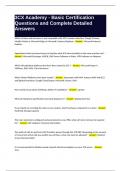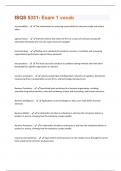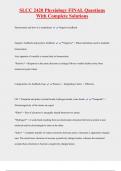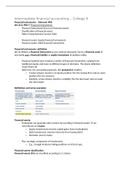Financing a Company.
There are two key avenues for a company to raise finance:
Equity finance - consideration, normally money, for buying shares in the company.
Debt finance – loans
Companies that are trading/in business will have shares. Most will always have loans too, but they
don’t have to.
Shares.
The possession of shares is evidenced by a share certificate. Shares can appreciate or
depreciate in value depending on how well the company is doing.
Shares produce income for the shareholders – income by way of dividends if the company is
doing well.
Company’s may use more than one type of share. Each class of share will have its own rights
as defined in the articles of association.
Types of share.
Ordinary.
o Ordinary shares give shareholders a right to be in general meetings and to vote, as
well as the right to receive dividends when the company is in profit.
Preference
o Preference shares may add a priority to those shareholders who have them – such
as a prioritizing the payment of those dividends.
Non-voting.
Redeemable.
o Commonly required by venture capitalists.
Issuing Shares.
Companies do not have to have a nominal share capital.
There is no limit in the number of shares a company can issue. Directors will always have a
sufficient shares to issue unless the articles of association restrict the number of shares that
can be issued.
Directors have to check the authority to allot, and pre-emption before they can actually
issue.
Authority to allot – directors need authority from the articles or an ordinary resolution of
shareholders which much be filed. Authority is presumed where there is only one class of share. The
authority must state the number of shares that can be allotted and the period of authority
(maximum of 5 years).
Pre-emption – can’t simply offer shares to the public, only public companies can trade on the stock
exchange. In a private company directors cannot simply sell the shares to someone who has made
an offer to buy them.
Where shares are issued wholly for cash, they must be offered to existing shareholders first. Where
this rule applies the shares will be offered to existing shareholders in the proportion to their current
shareholding. If these shareholders decline the directors can then accept the offers.
The pre-emption can be removed by a special article under section 567 of the CA06 or by the special
resolution of shareholders. Notice must state the reasons for removing the pre-emption. The pre-
emption can be removed for just one issue or generally.
, Payment for shares.
• Payment will usually be in cash. If shares are partly paid up, the shareholder remains bound
to pay the shortfall on each share
• If shares issued at a premium, the “excess” must be kept in a share premium account.
• Cannot issue shares at a discount – less than their nominal value.
Once issued the company must send paperwork to companies house – FORM SH01.
They must also send a share certificate to the purchaser and update the statutory books.
Statutory books are the books that the company must keep up to date; it is required by statute. They
cover a variety of important issues and contain most of the important information about a company.
Should always check that the articles allow for what the company is trying to achieve.
It is likely that the shareholders will have to authorise some or all of the transaction if it involves the
issuing, or transfer of shares. Creditors may also need to be informed.
Directors also have to declare that a company is solvent, and are liable to criminal sanctions if they
get this wrong and therefore understanding the movement of shares is important.
Transfer of Shares.
• Concerns shares that have already been issued and are now being “transferred” – by sale or
gift
• Transferor (the shareholder) completes and signs a stock transfer form.
• Stock transfer form and original share certificate is given to the Transferee (the shareholder-
to-be)
• If it is a sale, stamp duty (is payable). NOT STAMP DUTY LAND TAX. JUST STAMP DUTY.
THEY ARE DIFFERENT.
• The transferee Sends (stamped) STF and share certificate to the company
• Directors, subject to the Articles, will enter the transferee into the Register and send out a
new certificate
• Each year the Confirmation Statement (formerly the Annual Return) will notify Companies
House of all such changes
• If transferee is a director, he must notify his interest in the shares to the company.
• Before transferring shares, we need to check the Articles of association of the company.
o Model Articles have a minor restriction so it is common for companies to want some
control over share transfers
o There are a number of possible restrictions – if they apply the transferor remains the
legal owner, but will hold the shares on trust for the transferee.
Transmission of shares.
Automatic process that applies upon the death or bankruptcy of a shareholder.
The shares best in the personal representatives/ trustee in bankruptcy.
Article 27 - The personal representatives are entitled to dividends but cannot vote.
Maintaining the share capital.
The general rule is that the share capital (the amount of money paid for the shares) must be
maintained
Share capital is the fund of money that creditors will look to for payment of their debts
Therefore strict rules to ensure that this fund is not misused or simply returned to the
shareholders











